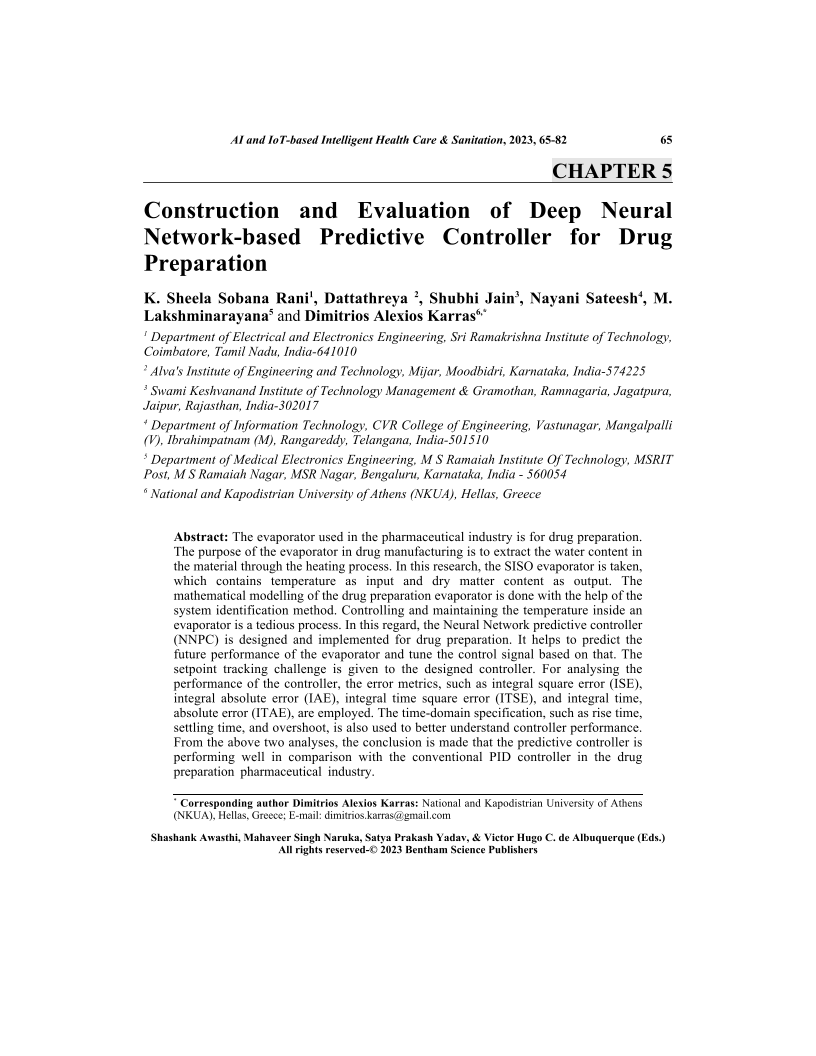Construction and Evaluation of Deep Neural Network-based Predictive Controller for Drug Preparation

- Authors: K. Sheela Sobana Rani1, Dattathreya2, Shubhi Jain3, Nayani Sateesh4, M. Lakshminarayana5, Dimitrios Alexios Karras6
-
View Affiliations Hide Affiliations1 Department of Electrical and Electronics Engineering, Sri Ramakrishna Institute of Technology, Coimbatore, Tamil Nadu, India 641010 2 Alva's Institute of Engineering and Technology, Mijar, Moodbidri, Karnataka, India-574225 3 Swami Keshvanand Institute of Technology Management & Gramothan, Ramnagaria, Jagatpura, Jaipur, Rajasthan, India-302017 4 Department of Information Technology, CVR College of Engineering, Vastunagar, Mangalpalli (V), Ibrahimpatnam (M), Rangareddy, Telangana, India-501510 5 Department of Medical Electronics Engineering, M S Ramaiah Institute Of Technology, MSRIT Post, M S Ramaiah Nagar, MSR Nagar, Bengaluru, Karnataka, India - 560054 6 National and Kapodistrian University of Athens (NKUA), Hellas, Greece
- Source: AI and IoT-based intelligent Health Care & Sanitation , pp 65-82
- Publication Date: April 2023
- Language: English
Construction and Evaluation of Deep Neural Network-based Predictive Controller for Drug Preparation, Page 1 of 1
< Previous page | Next page > /docserver/preview/fulltext/9789815136531/chap5-1.gif
The evaporator used in the pharmaceutical industry is for drug preparation. The purpose of the evaporator in drug manufacturing is to extract the water content in the material through the heating process. In this research, the SISO evaporator is taken, which contains temperature as input and dry matter content as output. The mathematical modelling of the drug preparation evaporator is done with the help of the system identification method. Controlling and maintaining the temperature inside an evaporator is a tedious process. In this regard, the Neural Network predictive controller (NNPC) is designed and implemented for drug preparation. It helps to predict the future performance of the evaporator and tune the control signal based on that. The setpoint tracking challenge is given to the designed controller. For analysing the performance of the controller, the error metrics, such as integral square error (ISE), integral absolute error (IAE), integral time square error (ITSE), and integral time, absolute error (ITAE), are employed. The time-domain specification, such as rise time, settling time, and overshoot, is also used to better understand controller performance. From the above two analyses, the conclusion is made that the predictive controller is performing well in comparison with the conventional PID controller in the drug preparation pharmaceutical industry. nbsp;
-
From This Site
/content/books/9789815136531.chap5dcterms_subject,pub_keyword-contentType:Journal -contentType:Figure -contentType:Table -contentType:SupplementaryData105

